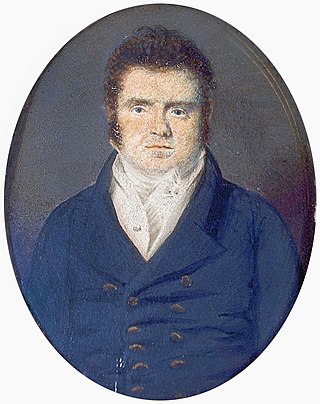
John Edward Taylor was an English business tycoon, editor, publisher and member of The Portico Library, who was the founder of the Manchester Guardian newspaper in 1821, which was renamed in 1959 The Guardian.

John Bright was a British Radical and Liberal statesman, one of the greatest orators of his generation and a promoter of free trade policies.
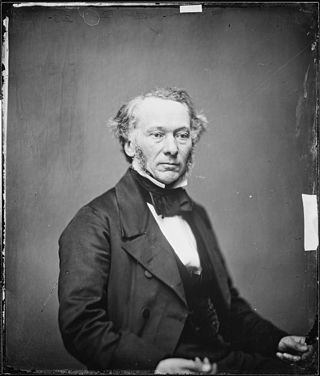
Richard Cobden was an English Radical and Liberal politician, manufacturer, and a campaigner for free trade and peace. He was associated with the Anti-Corn Law League and the Cobden–Chevalier Treaty.

The Anti–Corn Law League was a successful political movement in Great Britain aimed at the abolition of the unpopular Corn Laws, which protected landowners’ interests by levying taxes on imported wheat, thus raising the price of bread at a time when factory-owners were trying to cut wages. The League was a middle-class nationwide organisation that held many well-attended rallies on the premise that a crusade was needed to convince parliament to repeal the corn laws. Its long-term goals included the removal of feudal privileges, which it denounced as impeding progress, lowering economic well-being, and restricting freedom. The League played little role in the final act in 1846, when Sir Robert Peel led the successful battle for repeal. However, its experience provided a model that was widely adopted in Britain and other democratic nations to demonstrate the organisation of a political pressure group with the popular base.

The Free Trade Hall on Peter Street, Manchester, England, was constructed in 1853–56 on St Peter's Fields, the site of the Peterloo Massacre. It is now a Radisson hotel.
Cobdenism is an economic ideology which perceives international free trade and a non-interventionist foreign policy as the key requirements for prosperity and world peace. It is named after the British statesman and economist Richard Cobden and had its heyday of political influence in the British Empire during the mid-19th century, amidst and after the endeavour to abolish the Corn Laws.

The Devonshire Club was a London gentlemen's club which was established in 1874 and was disbanded in 1976. Throughout its existence it was based at 50 St James's Street. The major Liberal club of the day was the Reform Club, but in the wake of the 1868 Reform Act's extension of the franchise, the waiting list for membership from the larger electorate grew to such an extent that a new club was formed to accommodate these new Liberal voters. The clubhouse was on the western side of St James's Street. The original intention was to call it the 'Junior Reform Club', along the model of the Junior Carlton Club formed in 1866, but complaints from the Reform Club's members led it to being named the Devonshire, in honour of its first chairman, the Duke of Devonshire, an aristocrat from a long line of Liberals.

The Savile Club is a traditional gentlemen's club in London that was founded in 1868. Located in fashionable and historically significant Mayfair, its membership, past and present, includes many prominent names.

St Stephen's Club was a private member's club in Westminster, London, founded in 1870.
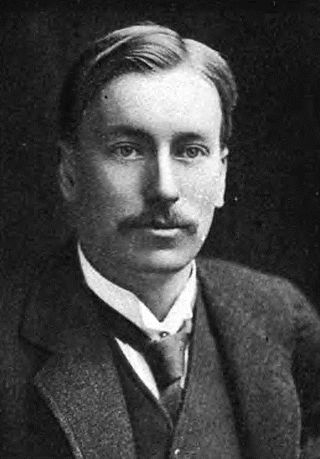
Francis Wrigley Hirst was a British journalist, writer and editor of The Economist magazine. He was a Liberal in party terms and a classical liberal in ideology.
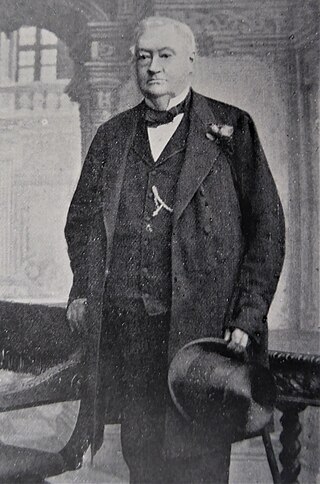
Thomas Bayley Potter DL, JP was an English merchant in Manchester and Liberal Party politician.

The St James's Club was a London gentlemen's club which operated between 1857 and 1978. It was founded by two leading diplomats and its members continued to be largely diplomats and authors. It was first established in Bennet Street, and after a brief spell in Mayfair, moved to 106 Piccadilly by 1868. In the final quarter of the twentieth century many gentlemen’s clubs of London suffered from declining membership, and in 1978 the St James's Club merged with Brooks's Club and vacated its premises.

The London International College in London was an early attempt at international education, operating from 1867 to 1889. It enrolled secondary-school students from a number of countries in a programme aimed at fostering internationalist sentiments in its pupils. Its official name was the London College of the International Education Society, and it was also known as the Spring Grove School, from its location in the Spring Grove area of Isleworth, London.
The Unionist Club was a short-lived London gentlemen's club, now dissolved, which was established in 1886, and had wound up by 1892. For the last four years of its existence, it had a clubhouse at 66-68 Pall Mall.
The City University Club is a gentlemen's club in the City of London, established in 1895. From its foundation until 2018 it operated from the top three floors of 50 Cornhill, of what was Prescott's Bank, a 1766 private bank which became a branch of part of the NatWest banking group. This arrangement was quite specifically intended by and between the bank's partners and the club of which they were founding members when the building was designed. The branch closed in 1999 and was turned into a pub of the Fullers chain.
This page provides brief details of primary schools in the borough of Hertsmere in Hertfordshire, England, United Kingdom.

Crockford's, the popular name for William Crockford's St James's Club was a London gentlemen's club, now dissolved. It was established in 1823, closed in 1845, re-founded in 1928 and closed in 1970. One of London's older clubs, it was centred on gambling and maintained a somewhat raffish and raucous reputation. It was founded by William Crockford who employed Benjamin Wyatt and Philip Wyatt to construct the city's most opulent palace of gentlemanly pleasure, which opened in November 1827. and he employed two of London's finest chefs of the time, Louis Eustache Ude and then Charles Elmé Francatelli to feed its members, food and drink being supplied free after midnight.
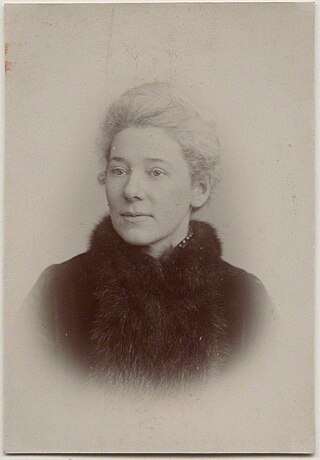
Emma Jane Catherine Cobden was a British Liberal politician who was active in many radical causes. A daughter of the Victorian reformer and statesman Richard Cobden, she was an early proponent of women's rights, and was one of two women elected to the inaugural London County Council in 1889. Her election was controversial; legal challenges to her eligibility hampered and eventually prevented her from serving as a councillor.
John Watts (1818–1887) was an English educational and social reformer. Originally an Owenite, whose economic writings affected the views of Friedrich Engels, he moved to a position more in favour of capital. In later life he had a multiplicity of interests and undertook many social projects.

Joseph Crook was a Liberal British Member of Parliament (MP) for Bolton.















